QNAP TVS-672X and TVS-872X NAS Drive Revealed
QNAP has been setting up to launch some key hardware in 2021 and as news of their recent hardware releases lands, one device that one could consider a combination of New and Old is the newly revealed QNAP TVS-672X and TVS-872X Intel Core 10Gbe NAS systems. Following in the product series of the TVS-x72XT and TVS-x72N (Thunderbolt and 5Gbe respectively) this new series utilizes many of the same hardware architecture features, but this time focuses on 10Gbe as it’s selling point. Of course, the TVS-x72 series has always been a firm favourite, right the way back to it’s first reveal back in 2018/2019, thanks to having an unparalleled level of hardware inside in terms of storage, expandability and graphical support that even manages to shine in 2021. With a price point that allows users who were attracted to the 72XT series, but were NOT interested in Thunderbolt 3 in their hardware environment, it’s going to be an appealing solution for many. So let’s take a closer look at this solution and see if it deserves your data.
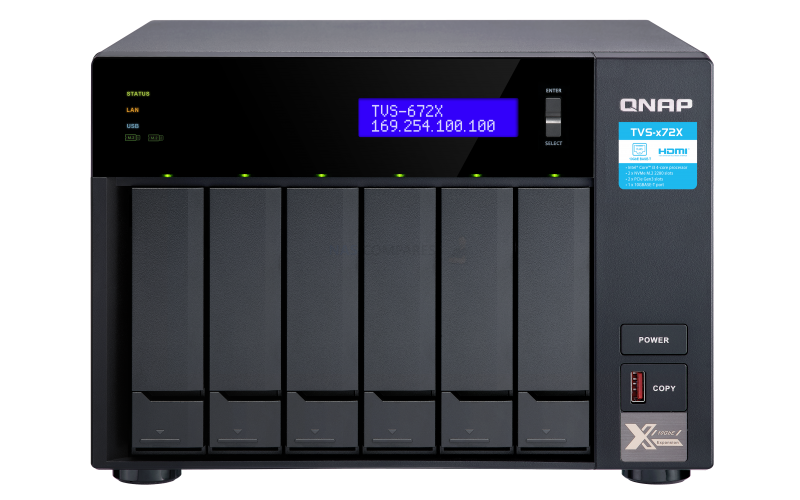 |
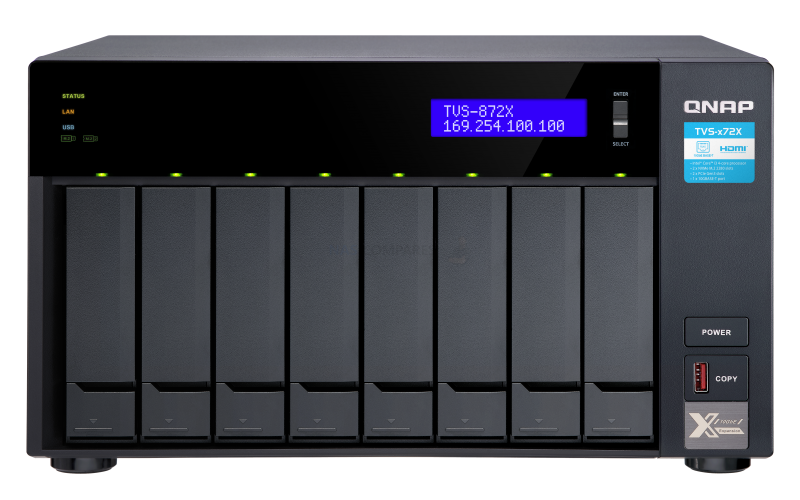 |
| QNAP TVS-672X
6-Bay, Intel i3 Solution, 8GB Memory, ZFS/EXT4 Setup, 2year Warranty |
QNAP TVS-872X
8-Bay, Intel i3 Solution, 8GB Memory, ZFS/EXT4 Setup, 2year Warranty |
QNAP TVS-672X and TVS-872X NAS – Hardware Specifications
The hardware specifications of the new QNAP TVS-872X and TS-672X are largely the same (though of course there is differences in total potential storage capacity, power consumption and size) and from what we can see, there is a real focus on upgradability. The highlights of the QNAP TVS-x72X NAS range are:
- Intel i3 8th Generation Processor
- 3.1Ghz Quad-Core
- Intel UHD Graphics 630, Supporting 4K and 4K Native Transcoding
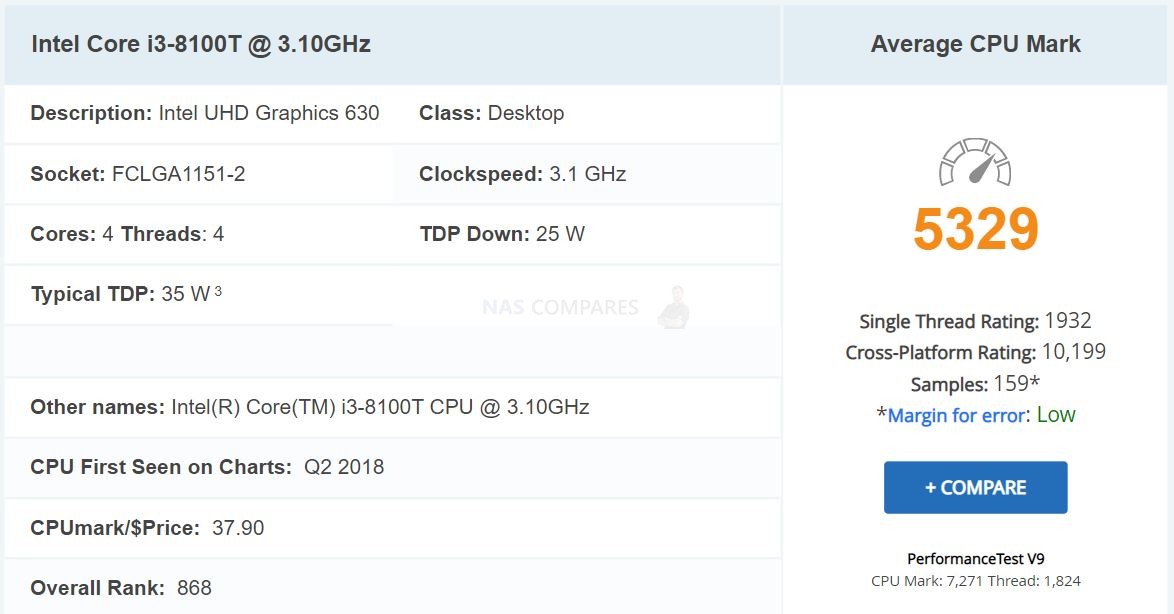
- 8GB DDR4 Memory that can be scaled up to 64GB over 2 slots
- HDMI 2.0 for 4K Mrultimedia Output and KVM
- 10Gbe Port x1, (not on an expansion card) and Copper in Architecture (10GBASE-T)
- 1Gbe Ports x2 for standard connctivity
- NVMe SSD Bays internally for Caching and Storage Pools as needed
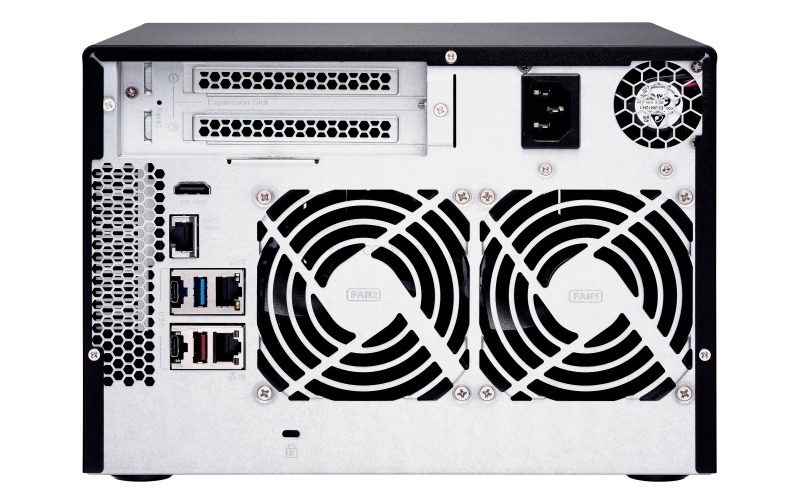 |
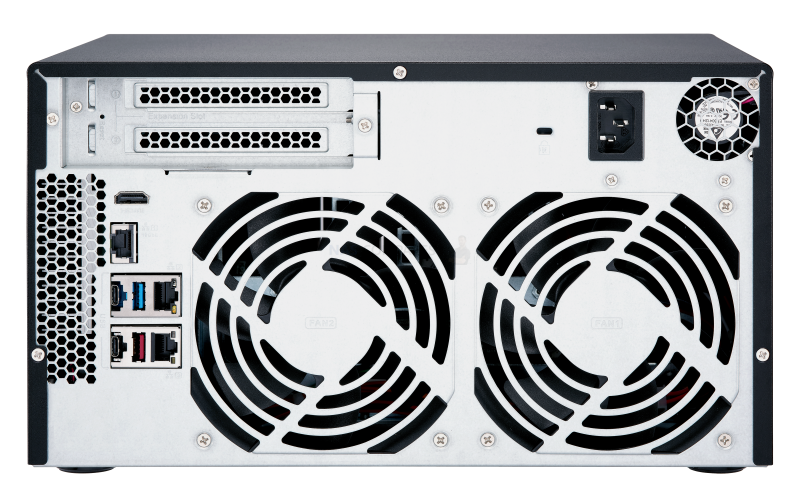 |
| QNAP TVS-672X | QNAP TVS-872X |
- USB 3.2 Gen 2 and Gen 1 Ports covering USB Type A/C
- License free 1st and 3rd party VM support
- 8 camera Licences in QVR Pro and 2 Licences in QVR Elite
- Hybrid Cloud/NAS support in Hybrid Mount, vJBOD, BoXafe, Hyper Data Protector, Hybod Backup Sync and more
A more detailed range of specifications on the QNAP TVS-872X and TVS-672X is below:

QNAP TVS-672X |

QNAP TVS-872X |
| Intel® Core™ i3-8100T 4-core 3.1 GHz Processor | Intel® Core™ i3-8100T 4-core 3.1 GHz Processor |
| Intel® UHD Graphics 630 | Intel® UHD Graphics 630 |
| 8 GB SODIMM DDR4 (1 x 8 GB) | 8 GB SODIMM DDR4 (1 x 8 GB) |
| 64 GB ( 2 x 32 GB) | 64 GB ( 2 x 32 GB) |
| 2 x SO-DIMM DDR4 | 2 x SO-DIMM DDR4 |
| 6x SATA Bays | 8x SATA Bays |
| 2 x M.2 2280 PCIe Gen3 x2 slots (2,000MB/s) | 2 x M.2 2280 PCIe Gen3 x2 slots (2,000MB/s) |
| 1 x 10GBASE-T (10G/5G/2.5G/1G/100M) | 1 x 10GBASE-T (10G/5G/2.5G/1G/100M) |
| 2 x 1GBASE-T (1G/100M) | 2 x 1GBASE-T (1G/100M) |
| 2x PCIe (Slot 1: PCIe Gen 3 x16 & Slot 2: PCIe Gen 3 x4 ) | 2x PCIe (Slot 1: PCIe Gen 3 x16 & Slot 2: PCIe Gen 3 x4 ) |
| 2 x Type-C USB 3.2 Gen 2 10Gbps & 2 x Type-A USB 3.2 Gen 2 10Gbps | 2 x Type-C USB 3.2 Gen 2 10Gbps & 2 x Type-A USB 3.2 Gen 2 10Gbps |
| 1 x Type-A USB 3.2 Gen 1 5Gbps | 1 x Type-A USB 3.2 Gen 1 5Gbps |
| 1x HDMI 2.0 (up to 3840 x 2160 @ 60Hz) | 1x HDMI 2.0 (up to 3840 x 2160 @ 60Hz) |
| 188.2 × 264.3 × 279.6 mm, 6.553 kg | 188.2 × 329.3 × 279.6 mm, 7.06 kg |
| 250W Internal PSU | 250W Internal PSU |
| 25.52 W / 45.6 W Power Use (Idle/Active) | 41.47 W / 65.03 W Power Use (Idle/Active) |
| CPU fan: 2 x 60mm blower fan | CPU fan: 2 x 60mm blower fan |
| 23.8 db(A) Reported Noise Level | 24.2 db(A) Reported Noise Level |
| Choice of ZFS & EXT4 File System | Choice of ZFS & EXT4 File System |
QNAP TVS-672X and TVS-872X NAS – Software Specifications
Although already touched on above, it is worth reiterating that the QNAP TVS-672X and TVS-872X both arrive with a choice of the QNAP QTS EXT4 File system software/GUI AND the option to choose the ZFS based QuTS Hero software/GUI at no additional cost. The software found with the QNAP TVS-672X and TVS-872X NAS can be broken down into 2 sections. namely those of the advantages that QNAP QTS already bring to a business user, and then the widespread system and storage advantages that QTS hero and ZFS bring as well. For those unfamiliar with the QNAP operating system, it arrives with hundreds of free applications, can be accessed from a web browser or desktop client, arrives with many, many apps for mobile on IOS and Android and is definitely in the top two operating systems you can get for network-attached storage devices. Often compared with their biggest rival Synology NAS and DSM, QNAP QTS GUI is designed in a way that will definitely appeal more to Android and Windows users, giving you everything you will need from a network-attached storage device in 2021 and arrives with constant updates for added features and security.
QNAP File Management Highlights
- File Station – File Browsing and Management Tool
- QSirch -Intelligent and Fast System-wide search tool
- QFiling – Smart and customizable long term storage and archive tool
- SSD Caching Monitor and Advisor – Allowing you to scale your SSD cache as needed, or get recommendations on how much you need
- QTier – The QNP intelligent, multi-layer tiering system that works to optimize your SSD and caching configuration
- Microsoft Active Directory– Support and cross-platform control of Active Directory processes
- Access-Anywhere with myQNAPcloud – Safe and secure remote access over the internet to your storage systems, apps or just file storage
- Qsync for multiple hardware environment backups and Sync – Client applications that can be installed on multiple 3rdparty devices and create a completely customizable and scaled backup network between your devices
- QuDeDupe / Deduplication tools – Allowing you to conduct backups between multiple devices and directories, but allows same-data in numerous locations to be only held once (but recorded in all locations) to allow smaller backups and lesser bandwidth consumption. Once again, remember that you will need to upgrade to 16GB of memory in order to take advantage of these more advanced ZFS utilities in practice.
Then you have KEY applications that are used on the QNAP NAS system that moves into tailored data access and use, such as:
- Hybrid Backup Sync 3 – Allows you to Backup and Sync with Amazon Glacier, Amazon S3, Azure Storage, Google Cloud Storage, HKT Object Storage, OpenStack Swift, WebDAV, Alibaba Cloud, Amazon Drive, Amazon S3, BackBlaze B2, Box, Dropbox, OneDrive, Google Drive, HiDrive, hubiC, OneDrive, OneDrive For Business, ShareFile and Yandex Disk. As well as backup to another NAS over real-time remote replication (RTRR) and USB connected media. All scheduled and all accessible via a single app user interface.
- vJBOD and Hybrid Mount – Gives you the ability to mount cloud storage as a visible drive within the NAS (and the apps access it as if it was local) or mount a % of space from your NAS onto another as a virtual chunk of space to use
- Multimedia Console – one portal access point to manage media access, searching, indexing and transcoding on your NAS device.
- Photo, Video and Music Station – Multiple file type tailored applications to access data in the best possible way that is suited to their output – along with smart searching, playlists and sharing
- Virtualization Station – Used to create virtual computers that can be accessed anywhere over the network/internet with the correct credentials. Supporting Windows, Linux, Android and more. You can import an existing VM image to the NAS, or you can even download Linux and Windows VMs directly to the NAS for trials for free
- Container Station – much like the VM app, Container station lets you mount and access smaller virtual tools and GUIs, then access them over the network or internet.
- Linux Station – Handy application to deploy multiple Linux based Ubuntu VMs from the NAS, all easily and within a few clicks
- QVR Pro and Surveillance Station – Surveillance applications that allow you to connect multiple IP cameras and IP speaks to your network and manage them with the applications. Arriving with 4 camera licenses for Surveillance Station and 8 licenses for QVR Pro (the better one IMO), QNAP is constantly updating this enterprise-level surveillance application – adding newer security hardware and software tools for 2020 (see QVR Face and QVR Door)
- QuMagie – Facial and Thing recognition application to help you retrieve, tag and catalogue photos by its use of AI to actually ‘view’ all your years of photos and let you search by the contents of them, not the file names.
- Download Station – A download management tool that can handle HTTP, BT, FTP and NZB files in bulk to be downloaded to your NAS drive and keep safe. As well as keeping an eye on your RSS feeds and keeping your podcast downloads automatically updated with every episode
- Malware Removers and Security Councillor – Along with Anti Virus software trials on the app centre, QNAP also provide numerous anti-intrusion tools and even a whole app interface to monitor in/outgoing transmissions with your NAS. It can make recommendations to beef up your security and keep you safe
Above are a few of my software overviews that cover the general GUI and system of QuTS Hero on the TS-h886, as well as RAID rebuild and storage management overviews of the system to give you some idea of what the TS-x73A range can and cannot do:
Space Saving Efficiency – Inline data deduplication, compression, and compaction reduce file size to conserve storage capacity and optimize performance.
Intelligent Memory Cache – Main memory read cache (L1 ARC), SSD second-level read cache (L2 ARC), and ZFS Intent Log (ZIL) for synchronous transactions with power fail protection are simultaneously supported to boost performance and security
RAID Z – Multiple RAID levels allow flexible capacity utilization. RAID Triple Parity and Triple Mirror deliver higher levels of data protection.
App Center – Apps for backup/sync, virtual machines/containers, content management, productivity, and more features can be used to expand the application potential of the TS-h972AX.
All in all, the fact that the QNAP TS-473A, TS-673A and TS-873A arrive with the option of the ZFS or EXT4 versions of the QNAP Software and GUI is a large part of what makes these NAS appealing.
QNAP TVS-672X and TVS-872X NAS – Release Date and Price
Although it appears the QNAP TVS-672X and TVS-872X have not been fully launched (possibly due to a combination of scheduled releases and the Chinese new year) full release cannot be very far off and it will likely arrive with a price tag not dissimilar to that of the QNAP TVS-672N and TVS-872N. The TVS-x72XT predecessor that started off this whole series has always been a firm favourite with SMB users, content creators and those whose lives revolve around the production of multimedia. These are areas that the TVS-672X and TVS-872X will continue to be desirable too, whilst still allowing a saving when not having to purchase the thunderbolt supported services too. Whether this device will support the recently released QNAP Thunderbolt 3 Upgrade Card QXP-T32P is still to be confirmed and the extent to which it will support the growing range of expansions in USB-C and PCIe (also, WHEN will the TR-104CT, TR-106CT and TR-108CT expansions arrive already?) is still yet to be clarified, but nevertheless, this is going to be an interesting release from the brand and one that has been requested for quite a while.
📧 SUBSCRIBE TO OUR NEWSLETTER 🔔
🔒 Join Inner Circle
Get an alert every time something gets added to this specific article!
This description contains links to Amazon. These links will take you to some of the products mentioned in today's content. As an Amazon Associate, I earn from qualifying purchases. Visit the NASCompares Deal Finder to find the best place to buy this device in your region, based on Service, Support and Reputation - Just Search for your NAS Drive in the Box Below
Need Advice on Data Storage from an Expert?
Finally, for free advice about your setup, just leave a message in the comments below here at NASCompares.com and we will get back to you. Need Help?
Where possible (and where appropriate) please provide as much information about your requirements, as then I can arrange the best answer and solution to your needs. Do not worry about your e-mail address being required, it will NOT be used in a mailing list and will NOT be used in any way other than to respond to your enquiry.
Need Help?
Where possible (and where appropriate) please provide as much information about your requirements, as then I can arrange the best answer and solution to your needs. Do not worry about your e-mail address being required, it will NOT be used in a mailing list and will NOT be used in any way other than to respond to your enquiry.

|
 |
Minisforum N5 Pro NAS - Should You Buy?
UGREEN DH4300 & DH2300 NAS Revealed - Good Value?
Aoostar WTR Max NAS - Should You Buy?
Xyber Hydra N150 NAS Review - Is This COOL?
Minisforum N5 Pro vs Aoostar WTR Max - The BIG Showdown
Do MORE with Your M.2 Slots - GREAT M.2 Adapters!
Access content via Patreon or KO-FI


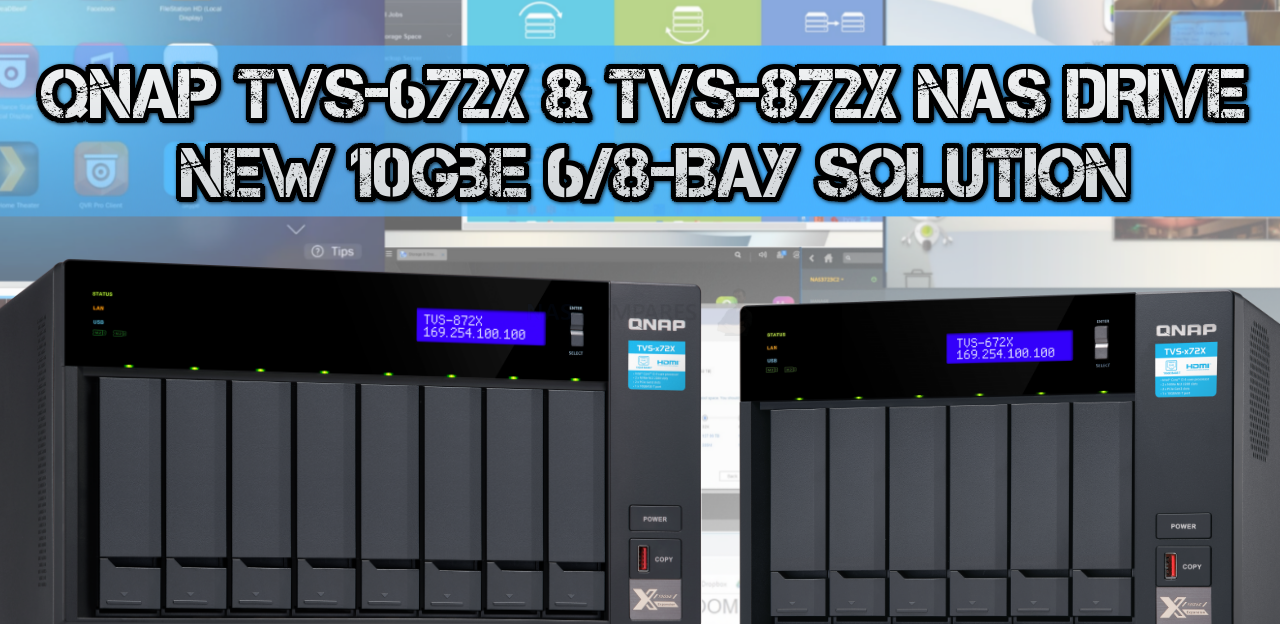




Can someone answer a question I have? Qnap says to put the system drive on two ssds on a Nas with only two ssds. Does that mean I can’t have a cache Drive?
REPLY ON YOUTUBE
RAID5/6 is NOT ZFS RAID!
REPLY ON YOUTUBE
Can I just add a thunderbolt pie card on this?
REPLY ON YOUTUBE
So… Quick Q. Will the 672n ever support ZFS or will I have to upgrade to an almost identical spec machine just to get it? Cheers.
If I need to guess, I would say No.